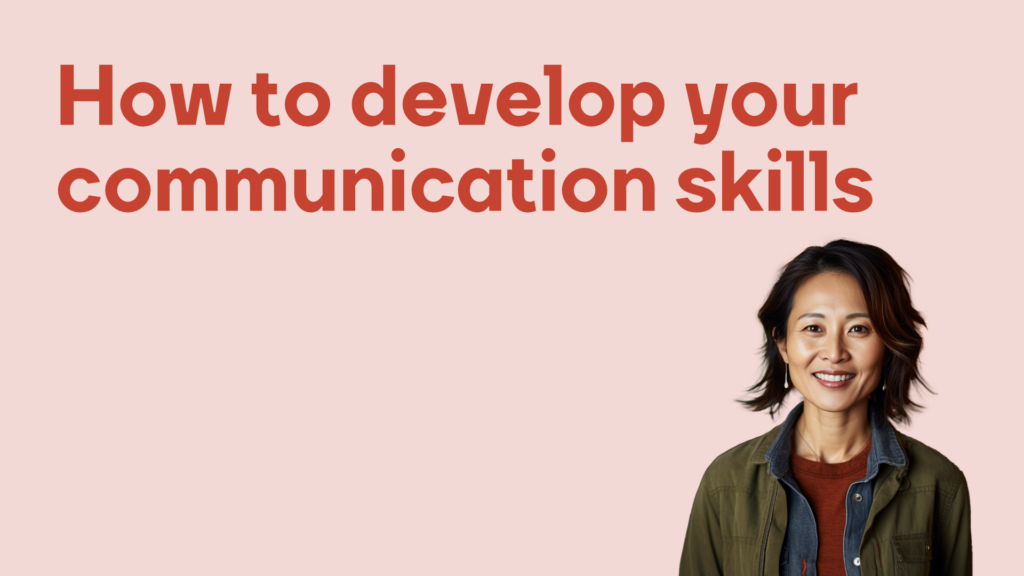When we think about communication, we tend to view it as a natural human skill which we learn as a child and develop as an adult. But how much of what we are taught goes beyond the basics and actually helps us effectively navigate the world as adults?
Ask yourself, how many times have I been in a conversation and been unable to avoid small talk? How often am I in a conversation when I realise, I’ve not actually been listening and instead have been thinking of my responses? All of these socially awkward moments that we can all at times find ourselves in could arguably be owing to a lack of real communication skills. The following tips are designed to assist you in overcoming these interpersonal hurdles and becoming a better communicator. Because after all, we are almost constantly communicating – we should have it cracked by now!

5 practical tips for developing your communication skills
1) Understanding Communication
Communication can be defined as an interaction whereby two or more parties engage in the transmission of information. It happens daily for most people and usually with a wide array of different individuals. Communication isn’t always verbal; it encompasses body language, facial expressions, and minimal prompts (“mmhmm”), and sometimes sign language or gesturing if communicating with anyone non-verbal. To truly understand communication, it’s essential to recognise that how successful we are in communicating can vary from day to day and can improve (but also decline) over time. This tells us that it is a skill that requires focus and presence in order to be enhanced.
The process that goes on in the mind when we are communicating is a rather complex one. If you’ve ever had to speak publicly and suddenly experienced a surge of adrenaline or nerves, then you’ll know all too well how these feelings can momentarily affect our communication abilities. Here, the ‘fight or flight’ system in the brain tells our body that we are in danger which triggers a faster heart rate, an increase in sweat (often experienced as clammy hands or sweaty pits!) and sometimes a dry mouth or even shaky hands. This tells us that despite often a great deal of practice, our body can anticipate threat simply from recognising that other people will be present when we make our speech.
As another example, when we engage in conflict with a friend or with a colleague, we can be ‘riled up’ by something they say, which can sometimes detract from the tone we wanted to set or the words we had wanted to say. It can be so easy to be triggered in this way because we often respond during interactions in a reactive way. We can get pulled into the feeling without being able to keep an emotional distance– especially if what the other person is saying is offensive or personal to us.
It can therefore be understood that it’s the presence of others which may trigger changes to our communication skills.
One of the first steps in developing our communication skills is to understand that how we communicate can be greatly impacted by our audience and those around us. Communication is an interpersonal skill that doesn’t rely exclusively on us, but on our opponent(s) too. Being aware of this should take the pressure off us a little and remind us that how successful an interaction may be isn’t always fully in our control. It can be regarded as a ‘two-way street’, and sometimes setting boundaries or managing expectations with someone before engaging in an interaction with them may help us to communicate in the way we had intended, regaining some control.
2) Self-reflection
One of the best things about developing our communication skills is that we have a million and one instances that we can reflect on when considering how to improve.
Think back to a time when someone you communicated with changed their mindset by the end of the interaction. This could be that they gained information over the course of the interaction, or that they moved from one stance to another. Now think about what you did well. Did you explain your points clearly in a way that they would understand? Did you take the time to listen to them before tailoring what you wanted to say?
Now think back to a time when this did not go well. Did you explain your points clearly in a way that they would understand? Did you take the time to listen to them before tailoring what you wanted to say?
There are lots of ways to analyse these occurrences. Some important factors can often be to do with the circumstances you were in when the interaction took place (whether it wasn’t the right timing or whether emotions were running high), and how you were feeling at the time (tired, stressed, distracted, tense). Taking a look back on these factors can really help us pick apart the catalyst to a bad interaction, and the key to a good one.
3) Embracing
As we do this self-reflection work, noticing the areas of our communication which may need some work can feel stressful. But remember we are all developing our own sense of communication style. And on this journey, it can be easy to bump into hurdles in the shape of people who have different preferences to us. For example, if you’re discovering that for you, it can be best to pause for a moment before answering because you need a little extra time to think, you may find that others don’t ‘have time’ or would prefer to ‘just dive in’. Here, it is important to stand your ground and embrace your preferences – after all, recognising what you need for effective communication will lead to a better interaction for all involved!
Being able to acknowledge that sometimes we require something from our personal toolkit to help us get by is a strength in itself. And being able to use a communication tool shows evidence of a growth mindset and willingness to improve. Well done you.
4) Prioritisation
When we think about our communication skills and what might need work, it can be easy to get overwhelmed by the vast array of social variables we might encounter. What is the issue I need to discuss and how much knowledge do I have about it? Am I qualified to talk about this and how am I coming across? Am I making sense? Have I explained that clearly? Is this person getting the hint? Are they even listening?
Sometimes, the best place to start is by thinking about how this information will be received. Although we can’t predict how someone will absorb something or react to it, by giving it some thought, we can attempt to get into our respondent’s mindset. From here, we can tailor the content of the information better and personalise the way we transmit it. If in doubt, don’t think – treat people how you would like to be treated, instead, think – treat people how THEY would like to be treated. With this awareness engaged, we can communicate from a place of recognition for the recipient, not just from our own perspective. Sometimes stepping out of our shoes and into someone else’s before communicating can be the best way to make a start.
5) Application
Practising our communication skills is crucial for development so that we can put our lessons learnt to the test and see how they may work in action.
- Pause:
Take the time during interactions to pause in order to check in with how you feel and to observe how they might feel. Staying present in the moment is the best way to enhance your awareness of the situation so that you can analyse how you are doing in real time. - Breathe:
If you are finding yourself wanting to jump in when someone else is speaking, practice taking a breath every time you feel yourself wanting to speak when perhaps it’s not your turn. Using your breath in this way reduces tension and allows your mind to settle so that it can focus better on what’s going on and what decisions it wants to make. This avoids reactivity and prevents us from being compulsive and instead, conscious. - Ask:
If you feel insecure and you find your mind is racing with questions during an interaction, try bringing these out into the open so these questions can be part of the conversation. It’s ok to interrupt yourself to ask someone if they are following along if you’re unsure. And it’s certainly better to interrupt someone (politely) to ask them to clarify, than not listening at all.
- Break:
If you find that your train of thought is taking you away from a conversation with someone, practice asking them if you can take a short break and come back to it. It may be that learning to work with your attention span takes some getting used to!




